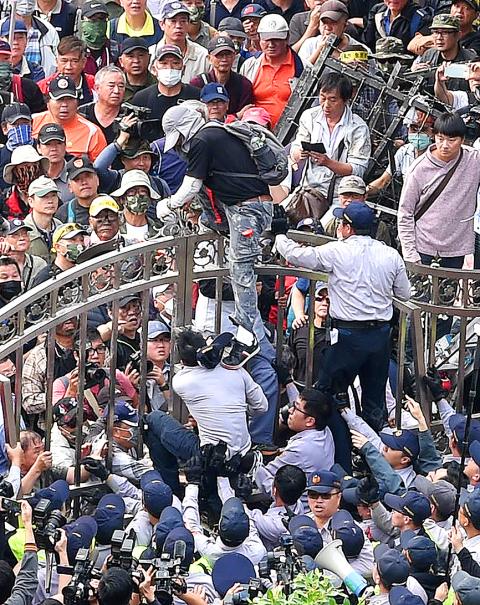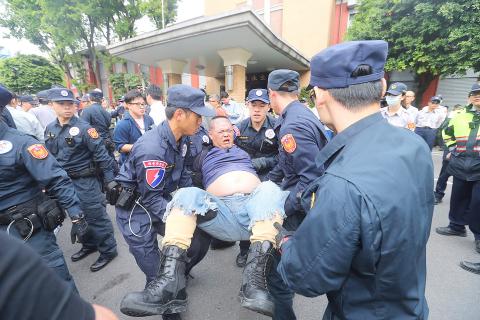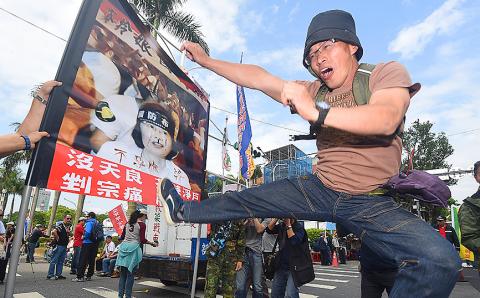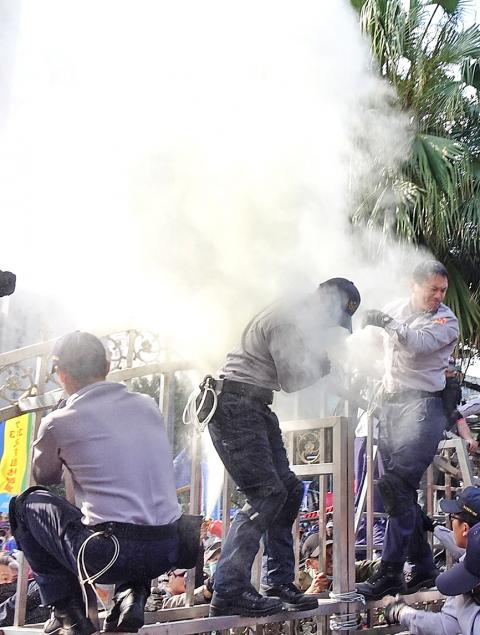As of press time last night, 32 police officers and 11 journalists had been injured, and 63 protesters arrested yesterday during a demonstration in Taipei against planned pension reform for veterans.
Retired military personnel at a public hearing at the Legislative Yuan in the morning called on the government to delay its plan to cut their pensions, as veteran groups staged a series of protests outside the legislature.
The Executive Yuan earlier this month unveiled draft amendments to the Act of Military Service for Officers and Noncommissioned Officers of the Armed Forces (陸海空軍軍官士官服役條例), which would set the minimum monthly pension at NT$38,990 and gradually phase out an 18 percent preferential interest rate on the savings of retirees who had enlisted before 1995.

Photo: Fang Ping-chao, Taipei Times
At the hearing yesterday morning, Luo Jui-ta (羅睿達), chief executive of the 800 Heroes veterans’ group, urged the government to delay reviewing the bill, because “it could be unconstitutional.”
The government should apply for a constitutional interpretation, because the bill might have violated the principle of legitimate expectation, he said.
“President Tsai Ing-wen (蔡英文) said no one would be ‘unable to live’ because of the reform, but how many of the nation’s veterans have become handicapped or sacrificed their marriage because of their service to the nation,” he said.

Photo: CNA
He also accused the government of using the pension fund’s impending bankruptcy as a reason for cutting military pensions.
“If the Ministry of National Defense allocates money toward the fund every year according to the law and properly manages the fund, the system would never go bankrupt,” he said.
“We just want justice and dignity for those who have fought for the nation,” Luo said, adding that the government should have communicated with them on the issue before drafting the bill.

Photo: Liao Chen-huei, Taipei Times
Previous reforms did not cause the same level of outrage, because they were not retroactive, Chinese Nationalist Party (KMT) Legislator Ma Wen-chun (馬文君) said.
To avoid disputes, “the government should apply the Labor Standards Act (勞基法) to civil servants, public-school teachers and military personnel, so that people of different occupations and generations are treated based on the same standards,” she said.
Democratic Progressive Party (DPP) Legislator Wang Ding-yu (王定宇) at 1pm announced the end of the hearing, despite protests from members of the 800 Heroes and KMT legislators, who had expected a second round of discussions.

Photo: Liu Hsin-de, Taipei Times
Members of the 800 Heroes criticized the DPP for being “arrogant and rude,” and vowed to never stop protesting until they receive a proper answer from the ruling party.
Outside the legislature, police had erected barbed wire and barricades around the Legislative Yuan and the Executive Yuan, and mobilized more than 1,200 officers to prevent protesters from breaking into the compounds.
At 3pm, protesters began clashing with police outside the Legislative Yuan compound, throwing wood planks, smoke grenades and PET bottles at them. Some attacked journalists and tried to take their cameras away.
At about 4pm, several protesters broke into the Legislative Yuan compound and were immediately arrested.

The US government has signed defense cooperation agreements with Japan and the Philippines to boost the deterrence capabilities of countries in the first island chain, a report by the National Security Bureau (NSB) showed. The main countries on the first island chain include the two nations and Taiwan. The bureau is to present the report at a meeting of the legislature’s Foreign Affairs and National Defense Committee tomorrow. The US military has deployed Typhon missile systems to Japan’s Yamaguchi Prefecture and Zambales province in the Philippines during their joint military exercises. It has also installed NMESIS anti-ship systems in Japan’s Okinawa

TRAGEDY STRIKES TAIPEI: The suspect died after falling off a building after he threw smoke grenades into Taipei Main Station and went on a killing spree in Zhongshan A 27-year-old suspect allegedly threw smoke grenades in Taipei Main Station and then proceeded to Zhongshan MRT Station in a random killing spree that resulted in the death of the suspect and two other civilians, and seven injured, including one in critical condition, as of press time last night. The suspect, identified as a man surnamed Chang Wen (張文), allegedly began the attack at Taipei Main Station, the Taipei Fire Department said, adding that it received a report at 5:24pm that smoke grenades had been thrown in the station. One man in his 50s was rushed to hospital after a cardiac arrest

PUBLIC SAFETY: The premier said that security would be tightened in transport hubs, while President Lai commended the public for their bravery The government is to deploy more police, including rapid response units, in crowded public areas to ensure a swift response to any threats, President William Lai (賴清德) said yesterday after a knife attack killed three people and injured 11 in Taipei the previous day. Lai made the remarks following a briefing by the National Police Agency on the progress of the investigation, saying that the attack underscored the importance of cooperation in public security between the central and local governments. The attack unfolded in the early evening on Friday around Taipei Main Station’s M7 exit and later near the Taipei MRT’s Zhongshan

ON ALERT: Taiwan’s partners would issue warnings if China attempted to use Interpol to target Taiwanese, and the global body has mechanisms to prevent it, an official said China has stationed two to four people specializing in Taiwan affairs at its embassies in several democratic countries to monitor and harass Taiwanese, actions that the host nations would not tolerate, National Security Bureau (NSB) Director-General Tsai Ming-yen (蔡明彥) said yesterday. Tsai made the comments at a meeting of the legislature’s Foreign Affairs and National Defense Committee, which asked him and Minister of National Defense Wellington Koo (顧立雄) to report on potential conflicts in the Taiwan Strait and military preparedness. Democratic Progressive Party (DPP) Legislator Michelle Lin (林楚茵) expressed concern that Beijing has posted personnel from China’s Taiwan Affairs Office to its